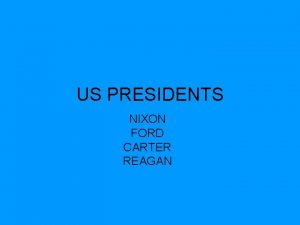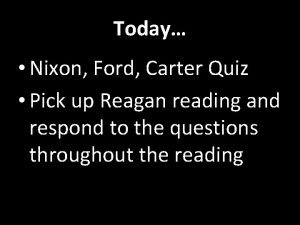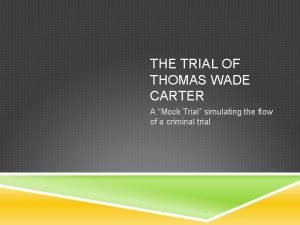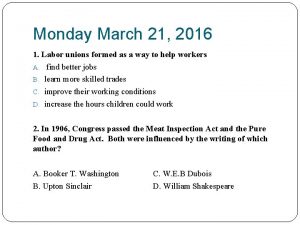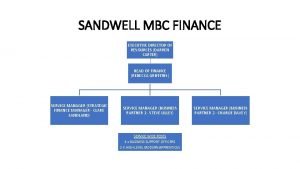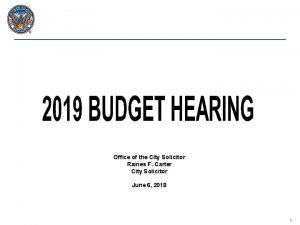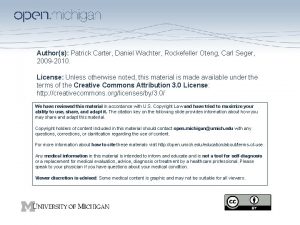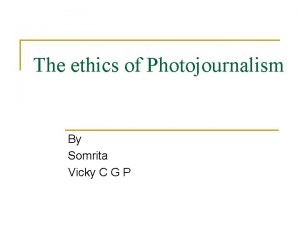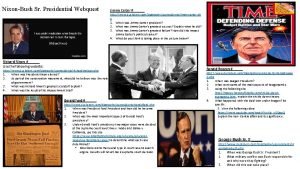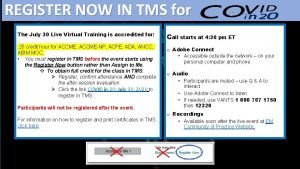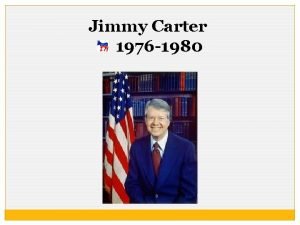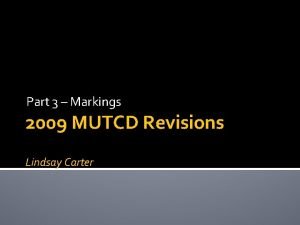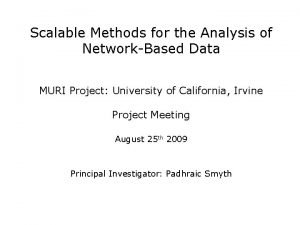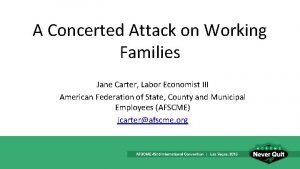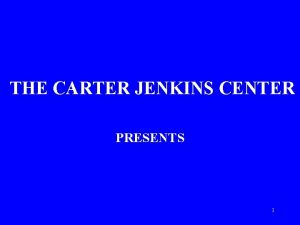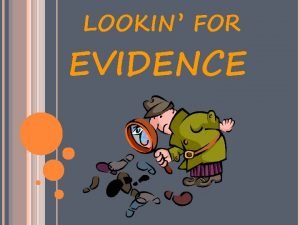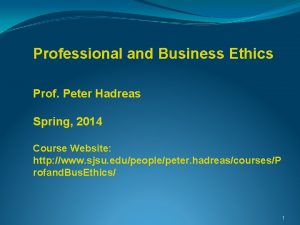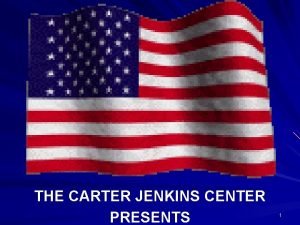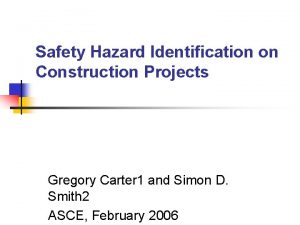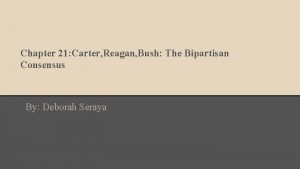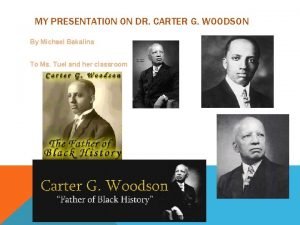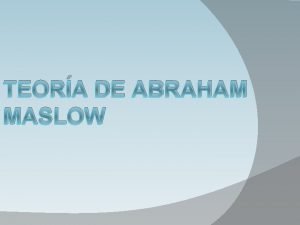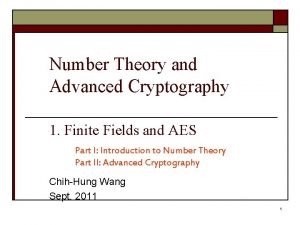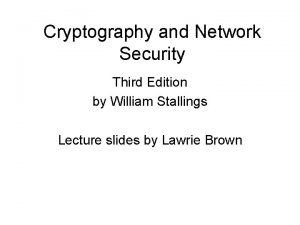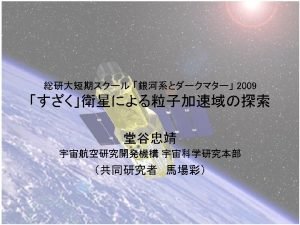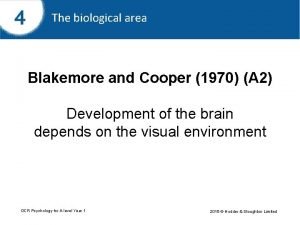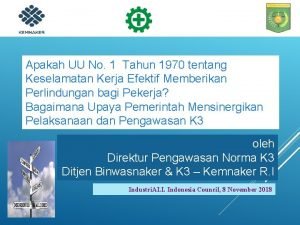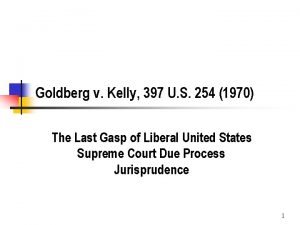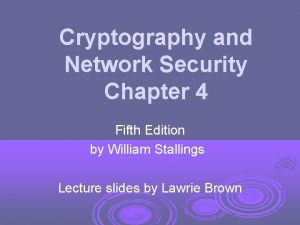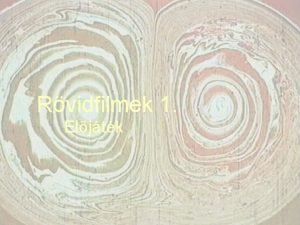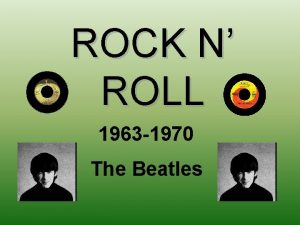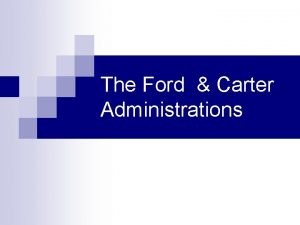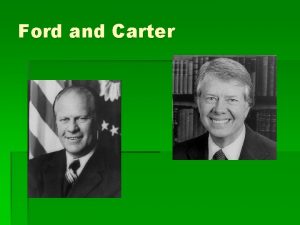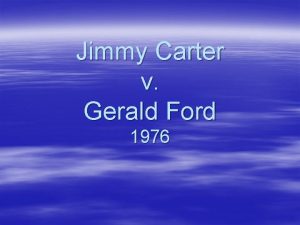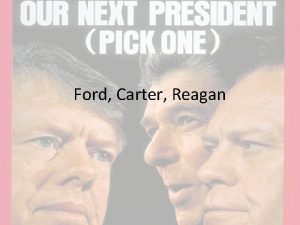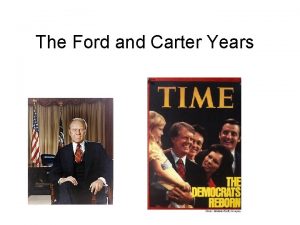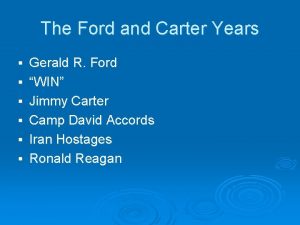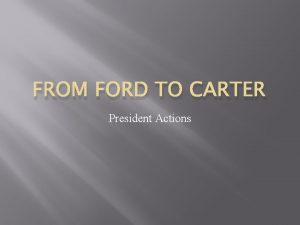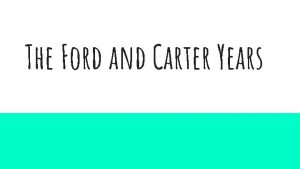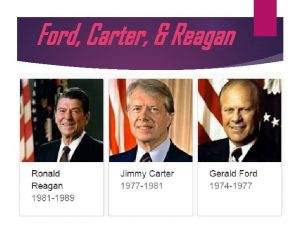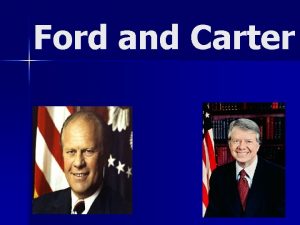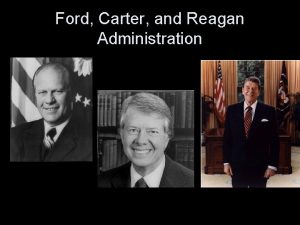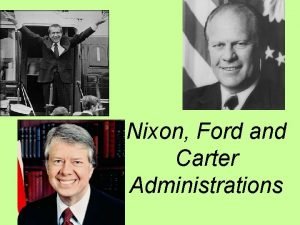Nixon Ford Carter The 1970 s The Nixon



































































- Slides: 67

Nixon, Ford & Carter The 1970 s

The Nixon Administration • Nixon sought to turn US on conservative path with New Conservatism – New Federalism • Nixon felt federal govt. became too strong under LBJ, wanted to return some power back to the states • To accomplish this, Nixon advocated Revenue Sharing – State govt’s would be allowed to spend federal tax dollars as they wished


The Nixon Administration – Nixon expanded funding for some social programs, such as Social Security, Medicare & Medicaid • However, Nixon attempted to cut the Job Corps & Office of Economic Opportunity, both social assistance to impoverished Americans • Nixon also tried to reform welfare with the Family Assistance Plan, but was attacked by both conservatives & liberals for being too tough/weak – Nixon used impoundment to withhold funding for programs didn’t like

The Nixon Administration • Nixon also sought to return law & order to American society for the great, Silent Majority – Abused presidential powers to watch political enemies • Plumbers placed wiretaps on liberals & Democratic Nat’l HQ at the Watergate Building • CIA compiled information on political dissidents • IRS investigated civil rights leaders • VP Spiro Agnew went after political rivals & media


The Nixon Administration • The ‘ 68 election was close & Nixon was always worried about losing – Nixon wanted to make inroads with the conservative South • Their dissatisfaction with Democratic Party was illustrated by George Wallace in ‘ 68 election – Launched Southern Strategy • Dept. of HEW told to delay integration in Southern schools • Opposed extending Voting Rights Act of 1965 • Promised to nominate Southerner to Supreme Court

The Nixon Administration – Nixon also appointed conservative, Southern justices to Supreme Court • • Warren Burger, MN (Chief Justice) Harry Blackman, MN (vote Roe v. Wade) Lewis Powell, Jr. , VA William Rehnquist, VA – However, Nixon would be quickly disappointed by his Supreme Court • Swann v. Charlotte-Mecklenburg Board of Education 1971 – Districts may bus students to prevent all-white or all -black schools


US Economy • US economy tanked at end of 1960 s & beginning of 1970 s because of Stagflation – High unemployment • Boomers entered workforce, flood US job market – High inflation • LBJ used significant deficit spending to pay for Great Society & Vietnam War • Fiat currency, the dollar no longer affixed to gold, but affixed to economy’s success instead – Since economy is decreasing, the dollar is devaluing

US Economy – Driving force behind struggling US economy was dependence on foreign oil • US received most of its petroleum from OPEC – During 1960 s, OPEC gradually raised oil prices— makes cost of US goods inflate – 1973, US backed Israel when attacked by Syria & Egypt during Yom Kippur War » Arab OPEC nations cut supply to US, when they resumed supply in 1974, prices were 4 x higher

The Nixon Administration • Nixon was a foreign policy president that dealt with more than the Vietnam War – Henry Kissinger encouraged Nixon to take a new approach to foreign affairs • Persuaded Nixon to abandon containment, massive retaliation & flexible response for a policy of Realpolitik – Illogical to ignore powerful countries based on ideology – Need to acknowledge powerful countries, even Communist ones, and build relationships with them

The Nixon Administration – Nixon used Détente policy to build relationships w/ Communist China & USSR • US prepared to negotiate & be flexible w/ Communist countries – Nixon visits China, winter 1972 • Won’t compete to control Pacific, will settle disputes cooperatively, including situation w/ Taiwan – Nixon visits USSR, spring 1972 • SALT I Treaty, limits number of ICBMs for 5 yrs


Watergate • 1971 Nixon sought to stop leaks after Pentagon Papers released – H. R. Haldeman, Nixon’s chief of staff, formed the Plumbers to harass Dan Ellsberg • Charles Colson (Nixon counsel) • G. Gordon Liddy (FBI) • E. Howard Hunt (CIA) • 1972 CREEP, headed by Nixon’s former Attorney General John Mitchell and Jeb Magruder, formed to reelect Nixon – Mitchell approved plan to break-in to DNC HQ


Watergate • June 17, 1972, James Mc. Cord, security head for CREEP, Liddy & Hunt arrested for breaking-in to DNC HQ (twice) – CREEP sought Democrat’s election strategy & if they had dirt on Nixon • Nixon ordered cover-up – Burglars bribed for silence ($500 k) – Incriminating documents shredded – CIA ordered to halt FBI’s investigation—J. Edgar Hoover, dead – Sept. 1972, Mc. Cord, Liddy & Hunt scheduled for trial in federal court with Judge John Sirica following the election

Watergate • Before trial of burglars, Watergate is overshadowed by Vietnam – However, Bob Woodward & Carl Bernstein of Washington Post kept on case • Published secret info from upset FBI informant W. Mark Felt • January 1973, Sirica found Mc. Cord, Hunt, & Liddy guilty – Judge threatened tough sentences because he thinks there is more than just a “petty burglary”

Watergate • April 1973, Nixon “accepted resignations” of John Dean III (pres. lawyer), H. R. Haldeman, John Ehrlichman (dom. adv. ), new AG Richard Kleindienst – Went on TV, announced new AG Elliot Richardson who will appoint special investigator, Archibald Cox – Mc. Cord accused Dean, Mitchell, and Magruder of knowing about/ordering the break-in – June 1973, Senate began grilling “all the president’s men”

Watergate • Senator Howard Baker asked, “What did the president know & when did he know it? ” – John Dean informed that Nixon abused FBI & CIA, placed wiretaps, ordered the cover-up & offered hush money » July 1973, pres. aid. Alexander Butterfield revealed Nixon recorded ALL of his presidential conversations • Nixon wanted to be able to write memoirs after presidency (idiot)


Watergate • Fall of 1973, things are ugly for Nixon – Nixon refused to turn over Nixon Tapes to Cox, Sirica & Senate Irvin Committee citing executive privilege • Saturday Night Massacre – Nixon wants Cox fired, but AG Richardson & Deputy AG William Ruckelshaus resign instead – Finally, Solicitor General, Robert Bork, fires Cox & hires replacement Leon Jaworski – VP Agnew forced to resign due to bribery, Speaker of the House Gerald Ford appointed VP – Nixon also in trouble for mistakes on taxes


Watergate • Remainder of Watergate centered around Nixon’s tapes – October 1973 -July 1974, Leon Jaworski pressed Nixon to release the tapes • Spring of 1974, Nixon released edited tapes for “profanity”, edited parts sometimes spanned 18 minutes • March 1974, president’s aids indicted on charges of conspiracy, obstruction of justice, and perjury – July 1974, Jaworski took Nixon to Supreme Court, upon appeal of Sirica’s ruling, to release the tapes

Watergate • US v. Nixon 1974 – Nixon argued he has Executive Privilege to keep tapes secret due to threat of national security • And, executive branch has right to determine privileged info, not judiciary – Supreme Court ruled Nixon must surrender tapes • President has right to executive privilege, but judiciary has right to review info to determine threats of national security – Marbury v. Madison 1803 » Established judicial review

Watergate • Nixon released the tapes on August 5, 1974, but US House Judiciary Committee voted to impeach – Nixon resigned August 8, 1974, just before the full House of Representatives voted on impeaching president • Nixon was never impeached, but is only president to resign office – Andrew Johnson & Bill Clinton impeached on partisan grounds » Johnson, Republicans thought he wasn’t doing enough after Civil War » Clinton perjured himself about a sex scandal


Gerald Ford • Started out rough from beginning, pardoned Richard Nixon – Americans quickly realized he’s a Ford, not a Lincoln • Ford because the butt of many jokes, partly because he’s a klutz, mostly because Watergate cost the presidency its prestige – Plan to beat inflation, Whip Inflation Now, didn’t have incentives to work • Americans, as it turns out, became lazy & selfish by the 1970 s



Gerald Ford • Ford continued on with Nixon’s foreign policy – Helsinki Accords • East & West agreed to diplomacy in Europe, but didn’t stop Mutual Assured Destruction – Vietnam fell in 1975 after fighting reignited in 1973, but Congress denied more funding – Cambodian pirates seized Mayaguez in Gulf of Siam, Ford used great show of military force to rescue 39 sailors • Lost 41 American soldiers

Jimmy Carter • 1976 Presidential Election – Ford held off Ronald Reagan for GOP nomination, Jimmy Carter won Democratic nomination – Jimmy Carter, peanut farmer & governor of GA, was Washington outsider • Honest & plain-spoken, won a narrow victory • US ready for down-to-earth president • Carter elected due to being an “outsider”, but refusing to play political games cost him


Jimmy Carter – Refused to pass out spoils to congressional Democrats & relied heavily upon himself & political advisors from GA • Beyond secluding himself politically, he was overwhelmed by trying to do everything himself • Nothing of substance accomplished – Became butt of SNL, too – Often addressed nation by fireside in a sweater, discussed energy & economy • Called it a moral equivalent to war, Americans must work with one another to achieve goals • Energy being Carter’s biggest issue, sent 100 s of proposals for energy conservation & development to Congress


Jimmy Carter – Beaten back by auto & oil lobbies • National Energy Act, placed tax on gas-guzzlers, de-regulated US oil & natural gas industries, and gave tax credits for development of alternative energies • Jimmy Carter wasn’t very popular with Americans as inflation hit double digits & economy worsens during his presidency – US no longer a major producer, goods manufactured cheaper overseas

Jimmy Carter – Many excluded from job market due to lack of education/training • US standard of living falls from #1 to #5 – “Malaise” or “Crisis of Confidence” speech caused many to believe he gave up, especially amongst self-centered Americans • Regents of University of California v. Bakke 1978 – Allan Bakke sued UC-Davis because he wasn’t admitted to medical school » 16 spots out of 100 reserved for minorities, UC-Davis’ Affirmative Action plan • Bakke’s scores & grades were quite competitive – Ruling: Quotas were prohibited

Jimmy Carter • Carter was focused on human rights—similar to Woodrow Wilson—Carter abandoned détente – No longer dealing with countries based on power, deals with countries based on protection of human rights • SALT II not signed because USSR invaded Afghanistan in 1979 – Carter releases “Carter Doctrine” • US returns Panama Canal because it’s right thing to do

Jimmy Carter • US heavily focused on Middle East during ’ 70 s, mostly because of oil prices – Constant conflict between Muslims & Palestinians with Israel devastating US economy • Camp David Accords, 1978 – Carter met with Egypt’s Anwar Sadat & Israel’s Menachem Begin » Egypt gets Sinai Peninsula, lost in Six Day War in 1967, returned » Egypt recognizes Israel’s right to exist as a country


Jimmy Carter • US became hyper-focused on Iran beginning in 1979 – 1953, US CIA orchestrated plan to put Reza Shah Pahlavi in control of Iran, agreed to provide US with favorable oil prices » January 1979, Iranians upset with his tyranny, overthrew him under leadership of religious leader, Ayatollah Ruhollah Khomeini • Overthrow is known as Iranian Revolution, many wanted to rid country of western ways – Iranian Hostage Crisis, November 1979 -Janaury 1981


Jimmy Carter – Revolutionaries disliked Carter letting Pahlavi into US for cancer treatment when mortally ill » Jimmy Carter • Iranian college students overrun US embassy in Tehran, take 52 US citizens—after releasing Blacks & women— hostage for 444 day • Iranians demanded: • Shah be returned to Iran • Return the money he “stashed” in US • Apologize to Iran

Jimmy Carter – April 1980, Carter launched rescue plan that failed miserably • Elaborate plan: helicopters, refueling cargo planes, & secretly secured trucks to meet up in deserted Iranian desert – Sandstorm & failed hydraulics crippled three helicopters, one crashed into cargo plane w/ fuel & exploded » In all, 8 soldiers killed • Hostages wouldn’t be released until Reagan sworn in & Iraq invaded Iran


The Middle East • Cradle of Civilization – Earliest of civilizations began around Nile, Euphrates & Tigris rivers • Fertile Crescent – Mesopotamia • Region between & immediately surrounding Euphrates & Tigris rivers – Area constantly subject to tribal conflict

The Middle East • Ottoman Empire – One of the most influential Muslim civilizations in history, began in 13 th century • Ended Byzantium Empire by conquering Constantinople (15 th century) renaming it Istanbul – Continued to expand into Europe – Empire begins to decline at end of 19 th century with colonization of Africa

The Middle East – Following Battle of Gallipoli, spring 1915, British & French secretly agree to carve up Ottoman Empire after WWI • Sykes-Picot Agreement, 1916 • Palestine to be made international zone due to its importance to many major religions – Temple on the Mount (Jews) » Site of King Solomon’s Temple • Location of the Ark of the Covenant


The Middle East • Wailing Wall (Jews) – Last remnants of Second Temple, Jesus preached here • Dome of the Rock (Jews & Muslims) – Mohammad ascended to Heaven – Abraham attempted to sacrifice Isaac/Ishmael • Church of the Holy Sepulcher (Christians) – Built by Constantine, place where Jesus was crucified, buried & resurrected


The Middle East • Status of affairs takes turn for the worse when England issued the Balfour Declaration, 1917 – England supported creation of a Jewish state in Palestine • Zion, Biblical reference to Holy Land • Zionism, Return to Holy Land – Although things wouldn’t get out of hand until after WWII, Muslims & Jews haven’t gotten along since Biblical times • Abraham, his wife & his mistress

The Middle East • Israeli-Palestinian conflict centered on conflict of various peoples – Arabs • Arabic people from the Arabian Peninsula and surrounding areas – Palestinians • Arabic-speaking, Muslim people originating in Palestine – Israelis • Hebrew-speaking people of Israel moved there by UN Mandate in 1947

The Middle East • Almost immediately after Allies withdraw from Palestine, Jordan invaded West Bank, Egypt invaded Gaza Strip – Six Day War, 1967 • Egypt blocked Israel’s Port of Eilat on Gulf of Aqaba • Israel launched attack, taking Gaza Strip & Sinai Peninsula from Egypt, the West Bank from Jordan & Golan Heights from Syria – Yom Kippur War, 1973 • Syria invaded Israel to reclaim Golan Heights, Egypt invaded Israel to reclaim Sinai Peninsula & Gaza Strip, both countries WHIPPED by Israel

The Middle East • Islamic Extremism follows WWI – Muslim Brotherhood, founded during 1920 s in Egypt by Hasan al-Bana, wanted Islamic republics after fall of Ottomans, especially after caliph abolished • Political org. focused on Islamic way of life, organized schools, sporting events, and non-secular communities – Iranian Revolution in 1979 marks beginning of Islamic Extremism • Iran should return to its Shiite-Islamic roots, rejects nonsecular, western influences – Rest of Middle East follows suit

The Middle East – Hezbollah • Lebanese, Shiite-Islamic extremist terrorist group, advocated for non-secular, non-west Middle Eastern countries after Iranian Revolution • Established in 1980 s due to Palestinian-Israeli conflict – Hamas • Palestinian, Sunni-Islamic extremists terrorists established after Six Day War – Eventually replaced Fatah as ruling power of Palestinian Liberation Organization after Yasser Arafat negotiated with Israelis during Oslo Accords


The Middle East – Al-Qaeda • Founded in the 1980 s to combat the 1979 USSR invasion of Afghanistan by Osama bin Laden • Now focused on expelling western influence and governments, implementing Islamic ones – September 11, 2001

The Middle East • Turkey is the anomaly of the Middle East – As Ottoman Empire declined, Young Turk movement gains popularity • Led by Mustafa Kemal, realized weaknesses of Ottoman Empire – Turkey should be independent of diverse Ottoman Empire, should be a republic – Needed to modernize, focus on education, secularize govt. – Turkey is the Western Middle East country

The Middle East • Kurds, Muslim-tribal people that speak Kurdish – After WWI, Kurdish people denied their own country • Currently live in Kurdistan, conglomerate or portions of ME countries – Experienced numerous hardships, esp. Desert Storm • Saddam Hussein gassed hundreds of thousands


The Middle East • Iran-Iraq War, 1980 -1988 – Iraqi leader Saddam Hussein (a Sunni) invaded Shiite-Iran over “territorial dispute” regarding Shatt al-Arab • Realistically, he was worried that he’d be overthrown by Shiites since they were majority of Iraq’s population – Modern era of biological warfare/terrorism begins – Ultimately a war of attrition, nothing sought was gained • Iraq would have to invade Kuwait in 1990 to cover war costs

The Middle East • Sunni Muslims (roughly 90% of Muslim world) – Believe that the caliphs—Islamic leaders—and theirs that followed Mohammad after his death in 7 th Century CE, were rightful leaders of Islam • Caliphs led Muslims through end of Ottoman Empire following WWI • Shiite Muslims – Separated from Sunnis due to their assassination of the fourth caliph’s son, meaning succeeding caliphs were not legitimate rulers—until Ruhollah Khomeini led a revolution in Iran

Environmentalism • Movement began with awareness of how everyday habits can ruin environment – Rachel Carson wrote Silent Spring, 1962 • Pesticides developed to deal with rodents & insects were causing significant ecological problems – DDT, banned in 1972 • Nixon combines federal agencies into Environmental Protection Agency in 1970 to set & enforce pollution standards


Environmentalism • Nuclear Energy – Alternatives to oil included nuclear power plants, which were potentially dangerous • 1979, Three Mile Is. , PA • 1986, Chernobyl, Ukraine (USSR) • Oil Resources, Alaska post-1968 – Alaskan Pipeline – 1989, Exxon Valdez • Oil tanker runs aground at Prince William Sound, Alaska, dumping 11 million gallons of oil into the ocean

 Nixon ford carter reagan
Nixon ford carter reagan Nixon carter gay
Nixon carter gay Wade carter attorney
Wade carter attorney Mukesh singla
Mukesh singla Carter tiernan
Carter tiernan Crushing tall poppies
Crushing tall poppies Dr fernando mora-mclaughlin
Dr fernando mora-mclaughlin Morse v frederick summary
Morse v frederick summary Jimmy carter
Jimmy carter Strategic finance
Strategic finance Raines carter atlanta solicitor
Raines carter atlanta solicitor Julien carter
Julien carter Brielle carter
Brielle carter Patrick carter md
Patrick carter md Ethics photojournalism
Ethics photojournalism Kevin carter akbaba
Kevin carter akbaba Carter review of initial teacher training
Carter review of initial teacher training Nigel p carter
Nigel p carter What does jaars stand for
What does jaars stand for Jackie carter porn
Jackie carter porn Jimmy carter ducksters
Jimmy carter ducksters Carter butts uci
Carter butts uci Carter mecher md
Carter mecher md Carter campaign
Carter campaign Lindsay carter
Lindsay carter Jennifer carter oxford
Jennifer carter oxford Carter butts uci
Carter butts uci Ucl career service
Ucl career service Jane carter labor economist
Jane carter labor economist Carter jenkins center
Carter jenkins center Kafka franz
Kafka franz Coach carter facts
Coach carter facts Gravis carter
Gravis carter History of the urban realms model
History of the urban realms model Uuuu0
Uuuu0 Jacque carter
Jacque carter Bob carter principal
Bob carter principal Heath-carter
Heath-carter Victor carter-bey
Victor carter-bey Rebecca carter skilling
Rebecca carter skilling Tahap perkembangan keluarga menurut carter
Tahap perkembangan keluarga menurut carter Carter jenkins daughter
Carter jenkins daughter Gregory carter
Gregory carter Carter reagan bush the bipartisan consensus
Carter reagan bush the bipartisan consensus Carter g woodson siblings
Carter g woodson siblings Jacob kounin withitness
Jacob kounin withitness Abraham maslow (1908-1970)
Abraham maslow (1908-1970) Inverse of 550 in gf(1759)
Inverse of 550 in gf(1759) Gcd of 1970 and 1066
Gcd of 1970 and 1066 1970 1980 1990
1970 1980 1990 Jacob s. kounin
Jacob s. kounin Tajfel 1970
Tajfel 1970 Important events in 1970
Important events in 1970 1967 1968 1969 1970 1971 1972 1973 1974 1975 1976
1967 1968 1969 1970 1971 1972 1973 1974 1975 1976 Blakemore and cooper (1970)
Blakemore and cooper (1970) Potter 1970
Potter 1970 Uu no. 1 tahun 1970 doc
Uu no. 1 tahun 1970 doc Goodmans levels of reflection
Goodmans levels of reflection Duane hanson tourists 1970
Duane hanson tourists 1970 Goldberg v. kelly
Goldberg v. kelly Luuletaja 1890-1952
Luuletaja 1890-1952 Gcd of 1970 and 1066
Gcd of 1970 and 1066 Mélyvíz 1970
Mélyvíz 1970 Codd 1970
Codd 1970 Bortons model of reflection 1970
Bortons model of reflection 1970 What happened in 1970
What happened in 1970 1963-1970
1963-1970 Bortons 1970 model of reflection
Bortons 1970 model of reflection
